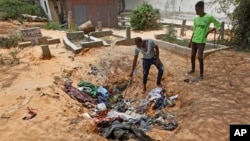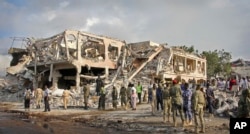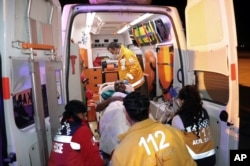The Somali government said search and rescue operations have ended, three days after a massive explosion killed hundreds of people at a busy intersection in Mogadishu.
Official casualty figures stand at 281 dead and more than 300 wounded, but the death toll could still rise, Information Minister Abdurrahman Omar Osman said Tuesday.
"The number can increase because there may be other victims either taken by their relatives who later died or others who died from their wounds," he told VOA's Somali service.
Local medical services have reported more than 300 dead from Saturday's blast.There was no immediate explanation for the discrepancy.
Government officials blame militant group al-Shabab for the explosion, although there has been no claim of responsibility. The al-Qaida-linked group has bombed numerous hotels and restaurants in the Somali capital since launching its insurgency in 2006.
Mogadishu's mayor, Tabit Abdi Mohamed, who spoke at the blast site Tuesday, praised hundreds of volunteers who have helped rescue survivors from the debris of demolished cars and buildings, and also cleaned up the rubble.
The mayor called for the city's residents and for all Somalis to turn this disaster into an opportunity to face "the enemy" — al-Shabab — and assist security agencies trying to protect residents of the capital and other cities.
"What has happened to us is pain beyond human capacity, but we can translate this disaster into a bold move to face our enemy and support the security," Mohamed said.
He also called for a massive rally in Mogadishu on Wednesday to pray for and mourn victims of the Mogadishu blast.
Global response
International aid continued pouring into Mogadishu Tuesday as hospitals tried to care for the hundreds of wounded.
A U.S. military cargo plane landed in Somalia's capital with medical and humanitarian aid supplies. Doctors sent by Kenya and Qatar also arrived. Somalia's neighbor, Djibouti, sent more than 30 doctors on Monday.
Kenya's foreign minister, Amina Mohamed, said the country has sent 11 tons of medicine to help Somali hospitals running low on supplies.
Qatar has airlifted 12 wounded people to Sudan for specialized treatment, and Mohamed said Kenya will fly 31 wounded to Nairobi.
The Somali government said Turkey was the first country to respond immediately after the bomb blast on Saturday. It sent a team of medical professionals and an emergency response plane carrying medical aid that later airlifted some 35 critically injured victims, including a VOA Somali reporter, to Ankara for treatment.






